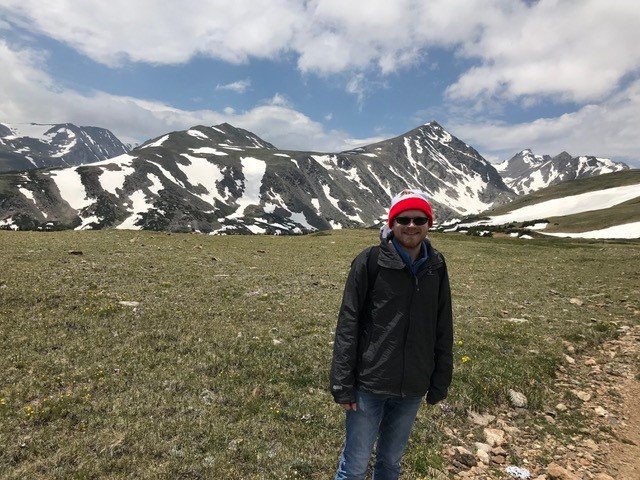Earth, Atmospheric and Planetary Physics

What led you to pursue a postdoctoral position in Physics at U of T?
U of T is one of the best places in Canada to work on atmospheric physics problems. The range of topics being studied here is really hard to beat anywhere else in the country. There are also lots of opportunities for collaboration with other institutions like Environment and Climate Change Canada as well as international partners. On a more personal level, after my PhD I wanted to shift gears a bit and pivot my research focus towards weather and air quality modelling. I was also looking for a project that would allow me to improve my computational skills. Lastly, I really wanted to stay in the Toronto area, so I was pretty excited when a postdoc position opened up at U of T that would allow me to achieve all of these goals!
Where did you complete your PhD? What was the topic of your PhD thesis and why?
I did my PhD right here in the Physics Department at U of T! My thesis was focused on modelling and quantifying natural emissions of hydrocarbons from plants so that we can understand their impact on global air quality and climate. These hydrocarbons are very reactive and can lead to the formation of harmful ground-level pollution, and they also impact cloud formation and aerosols which can impact climate by scattering sunlight. But it's hard to quantify these air quality and climate impacts because our emission estimates of these hydrocarbons are very uncertain. By combining information from numerical models and observations, my PhD research aimed to reduce these uncertainties and improve our global models of atmospheric composition.
Could you describe the focus of your current research as a postdoc? What inspired or motivated you to pursue this specific research area?
My current research as a postdoc is focused on high-resolution weather and air quality modelling in the Toronto area. My goal is to combine these high-resolution atmospheric simulations with a network of observations around the city to help estimate emissions of air quality pollutants and greenhouse gases from the city and the surrounding areas. I was drawn to this research area for two reasons. The first is that I am very interested in weather and atmospheric processes, so I wanted to pivot my research in that direction. My postdoc research builds on a lot of the emissions-related work I did during my PhD, but with a stronger focus on atmospheric processes. The second reason is that this is a very applied research area which is relevant in the field of policy making in Toronto. It's very motivating to know that the research I am doing might be directly useful for the city's emission reduction goals.
Have you collaborated with other researchers or departments during your postdoc? How have these collaborations enhanced your research?
My research is part of a much larger collaboration called the Toronto Atmospheric Monitoring of Emissions (TAME) project. This project involves students, postdocs, and faculty at U of T and York University, researchers at Environment and Climate Change Canada (ECCC), and stakeholders in various non-profit and private sector organizations. Being part of this collaboration has been a great learning experience for me since everyone involved has different expertise. It has also helped me develop my own research direction based on the needs and interests of my collaborators. When you're starting from scratch in a new project it's not always easy to figure out what to do, so having lots of colleagues to bounce ideas off has been very helpful.
How do you believe your research contributes to the broader field or addresses current challenges?
There's a lot of policy interest in reducing greenhouse gas and pollutant emissions from cities to mitigate the impacts of climate change and poor air quality, but we can't actually know if these policies are working as intended unless we have an independent way to monitor emissions. My research and that of my collaborators in the TAME project will help address this challenge for Toronto.
What challenges have you encountered in your research, and how have you worked to overcome them?
The biggest challenge in my postdoc research so far has been adapting to a new field. I have had to learn a whole new set of computational techniques as well as get up-to-date on the literature in an area that is very different from my PhD research. At the end of a PhD you are an expert in your own niche research topic, so switching to a different topic for your postdoc can be a tough transition. I'm tackling this challenge one day at a time by prioritizing my own learning and skill development alongside my day-to-day research tasks. I have found that spending a bit more time and effort to really understand the literature or a new computational tool right now will make my life much simpler in the future. This is a good idea for scientists at any career stage but it's especially important when you're starting a new project.
In what ways has your postdoctoral experience contributed to your professional development?
My postdoc has given me the opportunity to network with researchers and stakeholders outside of academia, including government, non-profit, and private sector organizations. For instance, during the summer, I got to spend 2 weeks in the mountains of Colorado at an Inverse Modelling summer school, where I got to network with researchers from all over North America and learn useful new skills for my postdoctoral research. On a day-to-day basis my research is also giving me the opportunity to develop new computational skills, which is something I'm really excited about.

Are you actively involved in departmental activities or events? How do you engage with the department's academic and social community?
There are interesting seminars in atmospheric physics pretty much every week, so I try to attend as many of those as possible. It's a good way to keep up to date in the field, and chatting with visiting speakers usually leads to good ideas.
What are your future career aspirations after completing your postdoc?
I really enjoy atmospheric science and would love to keep working in this field after my postdoc. My top choice right now is to work at Environment and Climate Change Canada. I have also found that I enjoy programming and software development more and more as I get further in my career, so I will be exploring opportunities in that direction as well.
What advice would you give to graduate students or early-career researchers considering a postdoc? Are there lessons learned during your postdoc that you believe would be valuable for others in the field?
A postdoc can be a great opportunity, but make sure you know why you're doing it. From career goals to family and geographic considerations, life can be complicated and there are a lot of things you need to consider. So before starting a postdoc just ask yourself what you hope to gain from it and how does it help you achieve your goals for your life and your career. Having a clear answer to these questions will help you make the most of your time as a postdoc and will also give you motivation to keep going when you inevitably run into challenges with your research. And whether you do a postdoc or not, don't forget to make time for your hobbies, your friends, and your family!

